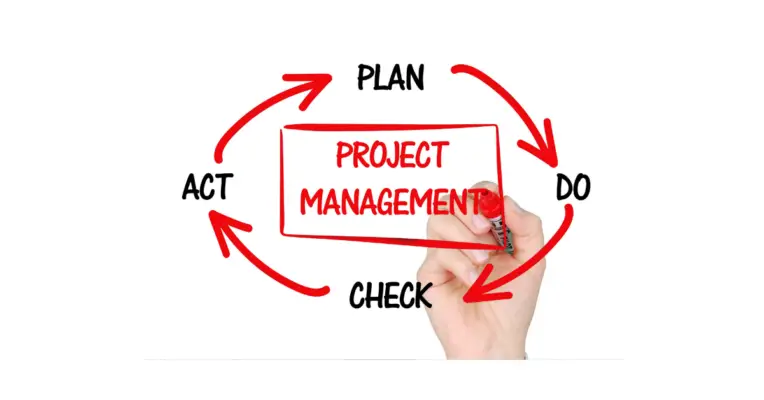In addition to assisting project managers, assistant project managers may also coordinate project activities, manage project documentation, and ensure that projects are completed within budget and on schedule.
They may also monitor project progress, identify and address potential issues or risks, and communicate project updates to stakeholders.
Assistant project managers often work closely with cross-functional teams, including engineers, designers, and other project team members, to ensure the successful execution of projects. They may also assist in preparing project reports, presentations, and other project-related documentation.
Assistant project manager jobs require strong organizational, communication, and problem-solving skills and the ability to work well under pressure in a fast-paced, deadline-driven environment.
This article provides an overview of the role of an Assistant Project Manager.
It defines the responsibilities associated with this position and the requisite skills necessary to excel in this role.
What is an Assistant Project Manager?
The role of an Assistant Project Manager involves assisting the Project Manager in planning, organizing, and overseeing projects within an organization. They are responsible for ensuring that projects are completed on time, within budget, and meet the required quality standards.
To qualify for this position, individuals typically need a bachelor’s degree in a relevant field, such as business administration or engineering and prior experience in project management or a related field.
Additionally, this role often requires strong organizational, communication, and problem-solving skills.

Job Overview
Job overview comprehensively describes the responsibilities and requirements associated with assistant project manager jobs.
Assistant project managers play an integral role in project management by assisting the project manager in planning, organizing, and executing projects.
They coordinate project activities, monitor progress, and ensure that projects are completed within the specified timeline and budget.
Assistant project managers also support the project team by facilitating communication, preparing documentation, and conducting research.
Regarding requirements, assistant project managers typically possess a bachelor’s degree in a relevant field, such as business or engineering, and have prior experience in project management or a related role. Strong organizational, communication, and problem-solving skills are essential for this position’s success.
The job overview comprehensively explains the assistant project manager’s responsibilities and qualifications.
Qualifications and Requirements
Qualifications and requirements for assistant project manager jobs typically include:
- A bachelor’s degree in a relevant field, such as business or engineering.
- Prior experience in project management or a related role.
The field of project management requires individuals to have:
- A strong understanding of project management principles and methodologies.
Additionally, candidates should possess:
- Excellent communication skills will be required to collaborate with various stakeholders and teams throughout the project lifecycle.
- Organizational skills, as they are responsible for coordinating and managing project activities.
The salary for assistant project managers can vary depending on factors such as:
- Experience.
- Industry.
- Location.
However, this role often provides opportunities for:
- Career growth.
- Advancement within the field of project management.
Job Responsibilities
This will focus on the key responsibilities of an assistant project manager, including strategic planning, liaising between project teams and senior management, managing project budgets and resources, developing and monitoring progress reports, and supporting change management processes.
Strategic planning involves identifying project goals and objectives, determining the steps to achieve them, and creating a roadmap for project success.
The assistant project manager plays a crucial role in facilitating communication and collaboration between project teams and senior management by ensuring that information is effectively shared, decisions are made in a timely manner, and any issues or concerns are addressed promptly.
The assistant project manager also manages project budgets and resources, ensuring they are allocated efficiently and effectively to meet project requirements.
They also play a role in developing and monitoring progress reports, which provide updates on the project status and help identify any potential risks or issues that must be addressed.
Strategic Planning
Strategic planning involves setting long-term goals and developing the necessary strategies.
In project management, project managers and project coordinators are crucial in developing and managing projects. They are responsible for defining project scope, coordinating tasks, and ensuring progress.
Project managers utilise project management software to effectively carry out strategic planning to organize and track project progress. This software enables project teams to collaborate, assign tasks, and monitor the development of projects.
Additionally, project managers implement field progress tracking processes to ensure the project is on track and within the set goals.
Strategic planning is essential for the successful management and execution of projects.
Liaise between Project Teams and Senior Management
To facilitate effective communication and coordination between project teams and senior management, a designated liaison can serve as a bridge to ensure that project objectives align with organizational goals and that both parties are well-informed about the project’s progress and challenges.
This role is crucial in project management as it requires strong communication skills and the ability to liaise between stakeholders.
The liaison is responsible for relaying project updates, field inspections, and financial estimates to senior management while advocating for project resources and addressing any concerns or issues the team raises.
This is an exciting time for individuals seeking career opportunities in project management as employment opportunities continue to grow and organizations recognize the importance of having a dedicated liaison to facilitate effective communication and coordination between project teams and senior management.
Manage Project Budgets and Resources
Managing project budgets and resources involves carefully allocating financial resources and coordinating personnel, equipment, and materials to ensure that project objectives are achieved within the specified budget and timeline.
In project management, an assistant project manager is crucial in overseeing these aspects of a project. Assistant project managers have the opportunity to work on various projects and collaborate with different contractors.
Effective communication skills are essential in liaising with team members, stakeholders, and contractors to ensure smooth project execution.
They are responsible for managing the expenses and estimating costs accurately. Time management is another critical skill required in this role to meet project deadlines.
The salary range for assistant project managers varies depending on experience in project management, with the potential for growth and advancement in this field.
Develop and Monitor Progress Reports
Monitoring progress reports is an essential step in project development. It provides valuable data and insights into the project’s performance and allows for timely adjustments and improvements.
Progress reports serve as a means of tracking the project’s progress, identifying any potential issues or bottlenecks, and ensuring that the project stays on track.
They also facilitate efficient communication between team members and stakeholders, enabling the project manager to make informed decisions and allocate resources effectively.
In commercial construction projects, progress reports are crucial in monitoring the project’s timeline, budget, and quality standards.
To excel in this role, an assistant project manager should possess excellent written and verbal communication skills and strong technical skills in project management.
Support Change Management Processes
Supporting change management involves implementing strategies and techniques to manage and navigate organizational change effectively. In assistant project manager jobs, this entails assisting in commercial projects’ pre-construction and administrative tasks.
Assistant project managers are crucial in supporting change management processes by collaborating with the field team and utilizing their relevant skills to ensure smooth transitions during project pipeline changes.
This requires a dynamic team that can adapt to evolving circumstances and effectively communicate changes to all stakeholders.
Assistant project managers may also be involved in outreach for projects, which can involve a hybrid role of liaising with external parties and ensuring that change management processes are properly implemented.
Maintain Project Documentation and Records
Maintaining project documentation and records is a crucial aspect of project management. It involves systematically organising and storing information related to the project, including cost estimates, communication logs, and progress reports.
Effective communication is crucial in ensuring that project documentation is accurate and up-to-date. The assistant project manager oversees these activities and ensures that all necessary documents are maintained and readily accessible.
This includes creating and updating project schedules, tracking deadlines, and documenting any changes or deviations from the original plan.
The wide array of elements involved in project management, such as budgeting, resource allocation, and risk management, necessitates carefully maintaining project documentation. This ensures stakeholders have a comprehensive view of the project and facilitates effective decision-making.
Documentation and record-keeping also support accountability and provide a historical record of the project’s activities, which can be valuable for future reference or audits.
The assistant project manager may work closely with the field office to gather and update information, ensuring that project documentation remains accurate and up-to-date.
Additionally, maintaining a calendar of activities helps to keep the project on track and ensures that deadlines are met.

Skills Needed for an Assistant Project Manager Role
Individuals must possess a range of key skills to succeed in an assistant project manager role.
Firstly, technical knowledge and expertise are essential for understanding the project requirements and coordinating with various stakeholders.
Strong leadership and communication skills are also crucial for effectively managing a team and coordinating project activities.
Furthermore, organizational and time management skills are necessary to ensure that tasks are completed efficiently and within specified timelines.
Lastly, problem-solving and conflict-resolution skills are important for addressing challenges that may arise during the project lifecycle.
Technical Knowledge and Expertise
Demonstrating a high level of technical knowledge and expertise is crucial for individuals seeking assistant project manager jobs.
In the civil engineering field, assistant project managers are responsible for overseeing the planning, execution, and completion of various design projects, including both large-scale and small-scale infrastructure projects.
They work closely with project managers and field superintendents to ensure that projects are completed on time and within budget.
Assistant project managers are expected to have a combination of education and practical experience in the engineering field.
They should be proficient in technical skills such as project scheduling, cost estimation, and risk management. Additionally, assistant project managers may have the opportunity to earn a competitive salary with bonus options, depending on the company and its growth opportunities.
The average base salary for assistant project managers reflects their level of technical expertise and can vary depending on the specific industry and location.
Leadership & Communication Skills
Developing strong leadership and communication skills is essential for individuals in supervisory roles. It allows effective collaboration with team members and ensures the successful execution of projects.
In today’s fast-paced and dynamic work environment, possessing these skills is crucial. It enables supervisors to adapt to changing times and effectively manage teams with diverse skill levels.
Effective communication and leadership skills also facilitate conflict resolution. This ensures a harmonious and productive work environment.
Employers often seek candidates with exceptional leadership and communication abilities. These skills enhance the overall productivity and success of a team.
Also, strong leadership and communication skills can open up new opportunities for career advancement within the organization.
Moreover, these skills are transferable to different industries. This makes individuals with such abilities highly sought after in various sectors, including life sciences.
Organizational & Time Management Skills
Effective organizational and time management skills ensure efficient workflow and productivity. These skills are essential for assistant project managers responsible for overseeing and coordinating various aspects of projects.
Assistant project managers must possess a high level of organizational skills to manage schedules for contractors effectively, ensure timely completion of tasks, and allocate resources efficiently.
Also, time management skills are necessary to prioritise tasks, meet deadlines, and maintain a productive work environment.
By effectively managing their time and organizing project schedules, assistant project managers can contribute to the success of their organization’s projects.
This can lead to increased annual revenue, a strong pipeline of projects, and the opportunity to work on amazing projects that push the boundaries of science fiction.
Moreover, these skills are also important for implementing revenue cycle initiatives and ensuring proper compensation for project stakeholders.
Mastering organizational and time management skills is crucial for assistant project managers to excel professionally.
Problem Solving & Conflict Resolution Skills
Problem-solving and conflict-resolution skills are essential in navigating complex situations and fostering harmonious relationships within organizations.
These skills are particularly important in today’s diverse and inclusive workplaces, where issues related to national origin, sexual orientation, and veteran status can arise.
Effective problem-solving and conflict-resolution skills can help organizations address challenges such as managing workloads and schedules, including determining the number of days employees should work per week.
Moreover, these skills are crucial in managing international projects, such as the food and beverage project in Hong Kong or the Kimmel project.
Furthermore, problem-solving and conflict resolution skills can also impact employees’ overall job satisfaction and well-being by ensuring fair and equitable compensation, such as cash compensation and life insurance, and promoting positive initiatives like FGP revenue cycle initiatives.
Frequently Asked Questions
How Much Experience Is Typically Required for an Assistant Project Manager Position?
The typical experience level required for an assistant project manager varies depending on factors such as the industry, company size, and specific job requirements.
However, candidates must often demonstrate a solid understanding of project management principles and relevant work experience.
What Is the Average Salary Range for Assistant Project Manager Jobs?
The average salary range for assistant project manager jobs varies depending on location, industry, and experience level. It is important to note that salaries can range from X to Y dollars per year.
Are Any Certifications or Qualifications Beneficial for Aspiring Assistant Project Managers?
Certifications and qualifications beneficial for aspiring assistant project managers include Project Management Professional (PMP) certification, Certified Associate in Project Management (CAPM) certification, and a degree in project management or a related field.
What Are Some Common Challenges Faced by Assistant Project Managers in Their Role?
Common challenges assistant project managers face in their roles include managing project timelines, coordinating team members, ensuring effective communication, resolving conflicts, and adapting to project scope or requirements changes.
Are There Any Specific Industries or Sectors That Commonly Hire Assistant Project Managers?
Various industries and sectors frequently employ assistant project managers to support project management activities.
These industries may include construction, IT, healthcare, finance, and manufacturing. The need for assistant project managers transcends specific sectors due to the universal nature of project management principles.

Conclusion
Assistant project managers play a crucial role in the successful execution of projects. They assist project managers in various tasks, such as coordinating activities, creating schedules, and monitoring progress.
Key responsibilities include organizing project documentation, facilitating communication between team members, and resolving any issues during the project lifecycle.
To excel in this role, assistant project managers need a strong set of skills, including excellent organization, communication, and problem-solving abilities.
Effectively supporting project managers, assistant project managers contribute to the overall success of projects.

Chris Ekai is a Risk Management expert with over 10 years of experience in the field. He has a Master’s(MSc) degree in Risk Management from University of Portsmouth and is a CPA and Finance professional. He currently works as a Content Manager at Risk Publishing, writing about Enterprise Risk Management, Business Continuity Management and Project Management.

